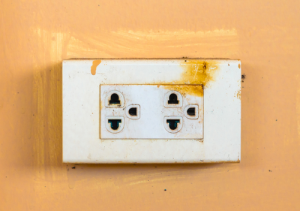The wall outlets in your home can and sometimes do wear out. Your outlets, also called receptacles, have a few moving parts that are prone to wearing down over time. Broken wall outlets can surface as a result of deteriorating neutral, hot, and ground connections.
When the metal contact points that link up to your neutral, hot, and ground connections wear over time, their gripping strength to hold onto cords also diminishes. When you start noticing exposed contact points on the connection to your plug and less room for the receptacle’s contact blades you might want to seek assistance.
In fact, wear and tear over time can cause resistance and heat to build up. This can, in turn, cause your fuse to blow or your circuit breaker to trip. A circuit breaker is easy enough to flip back on, but the real problem are worn-out outlets that could cause more serious problems like fires if left unaddressed.
Discolored or Broken Wall Outlets

Discolored or cracked outlets could cause a broken wall outlet and more serious problems. Discoloration or cracks means that the connections inside the outlet may be overheating and posing a danger to you and your family by increasing the risk of electrical fire.
The most common problem with plastic wall outlets are cracks that start out small then develop into bigger cracks, outright breaks, and eventually broken wall outlets. Any broken wall outlet that has a noticeable crack on its surface should be replaced immediately since it’s a safety hazard in its own right.
Plugs Falling Out
The plugs on your favorite devices falling out could cause the spring mechanism on your outlet to loosen your connection or produce a broken wall outlet. Why chance it? A certified electrician at Spyrka Electric can help diagnose your problem and tell you whether your broken wall outlet is the result of something like overheating or exposed loose terminals.
An Overloaded Circuit
A broken wall outlet could be a sign that you have faulty, dangerous wiring or even electrical damage behind the outlet. It’s possible that your broken wall outlet could be the result of an overloaded circuit, which can start an electrical fire if the problem is serious enough.
Make sure that if, for instance, you have a common 15-amp circuit that you’re replacing the broken wall outlet with a 15-amp receptacle. Using a 20-amp receptacle as a replacement won’t hurt any. In general, you want to miss with more amperage rather than fewer amps than you need since too little amperage in your receptacle can blow the circuit and potentially cause an electrical fire.
Sparks or Burning Smell
Receptacles that are warm or shooting off sparks are a tell-tale sign that you’re dealing with faulty wiring. The trained electricians at Spyrka Electric can help you fix broken wall outlets and potentially faulty wiring that’s causing them. If when you plug in an appliance you notice large sparks across appliances your wiring might need repair.
If you notice a large spark and hear a popping sound, then that’s a pretty surefire sign that you’re dealing with a loose wire. A loose wire or broken wall outlet needs to be inspected by a trained and experienced electrician before the problem gets any worse and potentially causes an electrical fire.
Pinpointing the loose electrical wire down the chain isn’t always simple or necessarily safe if you don’t have the experience, training, and diagnostic tools to make the call. The certified electricians at Spyrka Electric know exactly what to look for and can help both commercial and residential clients get back on track. Contact us for more information.

